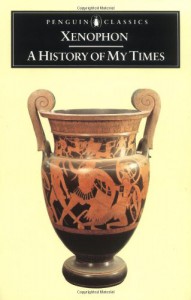After the Peloponesian War

After reading Herodotus, Thucydides, and the Anabasis, I must agree with a number of people that Xenophon's account of the period of Hellenic history from the closing stages of the Peloponesian War to, well, some point in time in which he stopped writing, was rather disappointing and without any point whatsoever. The Anabasis is a gripping story of how a group of Greek soldiers get trapped thousands of miles behind enemy lines and have to make a long march back home. Herodotus is a work of a grand scale where we travel the eastern Mediterranean meeting the peoples of the region and learning their culture, culminating in the Persian Wars where the small collection of city states that was Greece pretty much kicked Persian butt.
As for this book, well, with the exception of the Anabasis, it is what can be expected of Xenophon, and that is a pretty scrappy piece of work with no real research and biased towards one particular city state: Sparta. For a while it was considered to be the quintessential account of the period from about 410 BC to around 370 BC, that is until we discovered a bunch of ancient documents in a garbage dump in the Egyptian village of Oxyrhincus.
Until that discovery, there were only two sources about this period: Xenophon, and Diodorus, and since Diodorus had written much later, Xenophon was the preferred text. However, amongst the many fragments unearthed at Oxyrhincus (which included a medical report that was used in a civil action to prove that the plaintiff's injuries were caused by the house falling down on him) was a history of this (which has been referred to as the Hellenica Oxyrhincus) which ended up supporting Diodorus' version (and I hope I have the name right because if I don't, I'll look like one first class idiot who claims to be an Ancient Greek historian, but then again I have already done that in Rome when I was standing before Trajan's Column proclaiming that it was built as a memorial to Trajan's conquest of Parthia, at which point a Romanian woman appeared beside me and began to argue with me about how it was to commemorate his invasion of Dachia – she turned out to be right – thanks Wikipedia). As for the Hellenica Oxyrhincus, I suspect that the language of the document put it back to around the time that Xenophon was writing, which is why it (and Diodorus) have become the preferred sources.
However, a couple of things I noted and that was that every time somebody won a victory, they would put up a trophy of their victory, but then that is not surprising because if you go to Rome you will see remnants of these trophies everywhere (such as the Arch of Constantine commemorating him becoming the sole emperor of Rome), the Arch of Titus (commemorating his victory over the Jews), the Arch of Septimus Servus (commemorating something, most likely how much of an awesome dude his was), and of course, Trajan's Column (yes, commemorating his victory in Dachia – grumble, grumble).
Another thing I picked up was that even if you win some big war it does not mean that you enter into a period of endless peace. Here we have the Spartan King Lysander defeating the Athenians and bringing the Peloponesian War to an end, and pretty much creating Spartan hegemony throughout the region. However, we then discover that despite this victory, there are more battles being fought around the fringes of Greece. A couple of times some generals attempted to march on the Persian King (one of them being the subject of the Anabasis) but it was not until Alexander popped up that anybody managed to succeed. Also, despite Sparta holding power over the Grecian world, it did not mean that nobody else was going to attempt to take a shot at the title, and in this particular instance it was Thebes. Here we hear, sort of (Xenophon doesn't say anything about it), about the sacred legion. This legion was a legion of made up entirely of homosexual lovers (women didn't fight in wars in those days). The idea was that if you make up a band of soldiers who were connected in this way then they would fight much better and be much more devastating on the battle field. In the end it didn't work (they were beaten at Corinth).
One final thing (even though I could relate the idea above to Britain's experience after the Napoleonic Wars and the rise of Germany, as well as the United State's experience after the fall of the Berlin Wall and the rise of China, I won't) is that I have noted that there is reference to Dionysius of Syracuse in this book. The reason I mention that is because I have heard of him, and even read a book about him called [book:Tyrant] (it was one of those historical fictions that I generally do not like). The thing was that I did not actually know where this particular writer (who happens to be some professor of Ancient History) got his sources, and I suspect one of them was this book. However, the only connection between that book and this is that Xenophon mentions an invasion of Sicily by the Carthaginians and that Dionysius happened to be a tyrant in Syracuse.
 1
1


